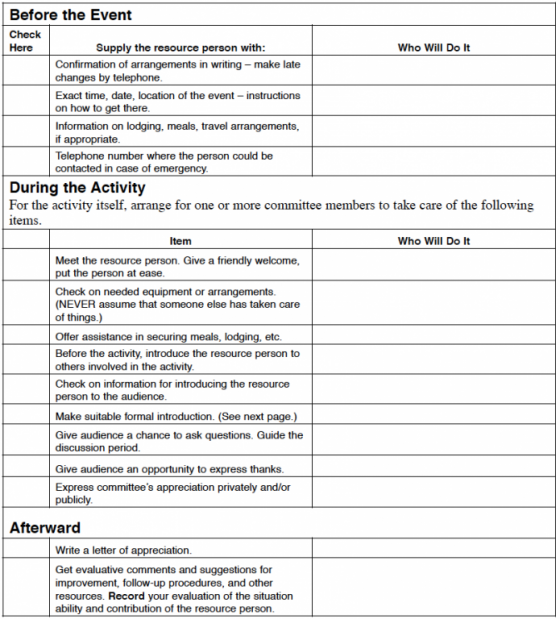Executive Summary
When developing the course curriculum, aims, and objectives, also training resource persons should be identified. Every training manager should try to get the best possible resource persons on a particular subject. As experts who contribute information and opinions to the course participants, the resource persons add important knowledge and value to the course. Here, you will find out about preparations needed when using resource persons in your training to ensure the success of their input.
Introduction
Resource persons are experts who contribute information and opinions to participants in a learning situation. They frequently are used to conduct educational activities, but may also be helpful to a committee at the program planning stage (see planning and process tools).
If you (the trainer/manager of a workshop) are not an expert in a given content you want to include in the course, you will need resource persons to ensure a good training where participants gain well-presented knowledge. Resource persons do not just add expertise but also make the course more interesting and attractive for the participants, as they can integrate their own experiences.
Resource persons may be from within or outside the organisation. Base your selection on their knowledge of the topic and ability to successfully cover and communicate information to the audience.
Proper preparation of the resource person – and your course participants – can enhance achievement of intended educational goals. Consider the ideas in this worksheet as you communicate with resource persons involved. Adjust each item to fit your own situation.
Origins of Resource Persons
Resource persons may have different origins:
- They may come from within the organising institution (since this is one of the main comparative advantages in implementing a specific training event).
- They may be subject-matter specialists at other institutions, national or international.
- They may be former trainees who have attended a similar training event.
- Participants of the workshop can also bring in their expertise in specific areas.
- It is good to keep in mind that the course participants themselves can contribute as resource persons in certain areas.
How to Find a Resource Person

Selecting good resource persons is the basis for interested participants and for a successful outcome of a training. Source: REGIOSUISSE (2009)
There’s always the possibility to use your network/organisation for finding an appropriate resource person for your training. Write an e-mail to the persons that come into question or call them if you think of one specific person. Also, you might find someone to help you at the university – students might be good resource persons as their knowledge is often very specific but still they are mostly flexible in time. It might be more difficult to find a professor for your course as their time schedule is very tight. Another source for resource persons might be the workshop itself – participants can also be experts in specific areas.
Advanced Preparations
Resource persons should be provided with the following information to effectively contribute to the training activity:
Type and Goal of the Workshop
- Type of activity (committee meeting, workshop, field day, etc.)
- Purposes of the event: curriculum aims and objectives of the training event
- Expected audience (participants) - it’s helpful to let the resource person know how many are expected, their occupation, approximate age or age range, educational level, prior knowledge of the subject etc.)
- Specific expectations / issues you want the resource person to
Information Regarding the Input
- Time and duration, date, and place of activity
- Time allotted for presentation
- Suggested methods to be used, or how audience will be involved (Will there be time for questions and answers? Is group discussion expected?)
Administrative Information
- Payment information
- Tentative agenda (Mention what else will be included, other resource persons and their participation responsibilities.)
- Name, address, and telephone number of person who will contact the resource person.
- Information on accommodation (if necessary)
- Information on available technology (projector, speakers, microphone etc.)
Further Information
- Sponsoring group and its purpose (if there is one)
- Attendance of media, etc.
CONFIRM the resource person’s availability for the event. Find out if any special facilities or equipment will be needed by the speaker. Also, get some biographical information for advance publicity and introductions.
Introducing Resource Persons
It’s an important duty to introduce a speaker – the introduction can determine how well the speaker’s ideas are accepted by the audience. Prepare yourself by asking these questions about the speaker:
- Who is this person? Audiences usually want to know the person’s name. Some may already know the person, but many will not. Introduce the speaker as someone the audience would like to know.
- Where does this person come from? This may seem insignificant, but listeners usually like to know two things: where the speaker was from originally and where the speaker comes from now.
- How is this person qualified on the subject?Choose facts to share from the speaker’s experience, abilities, and qualifications – things that relate to the subject of the talk.
- Why should I listen? Show a need for information on this subject. Create audience interest to the speech subject, even create suspense.
Checklist
The checklist helps you to remember all important steps when using a resource person in your training – before the event, during the workshop and afterward.

Checklist to remember all important steps when using resource persons. Source: UNIVERSITY OF ARKANSAS (n.y.)
It is always helpful having one or more resource persons with you at a workshop or training course. It can add extra quality to your training. Furthermore, inviting resource persons can save some preparation time, although you need to find someone who fits well to reach the course targets. The resource person adds value to the course, by making it more attractive and more diversified.
Basic Training for Trainers
Using Resource People
Using Resource People
http://collections.infocollections.org/
This website summarises information about what to consider when using resource persons.

